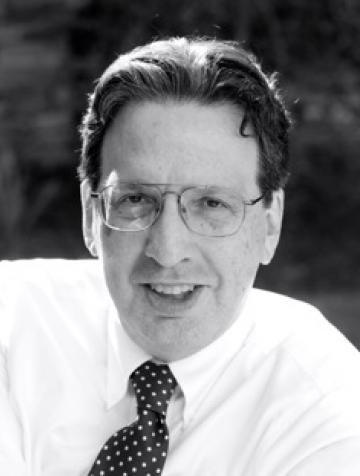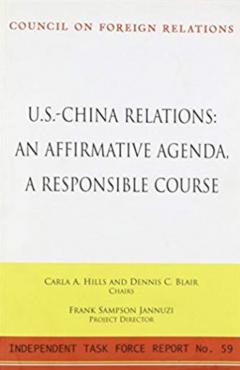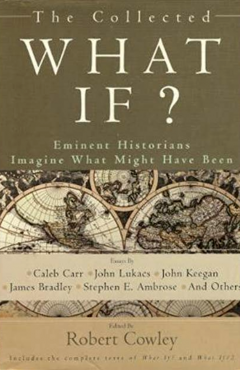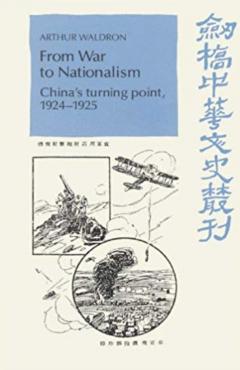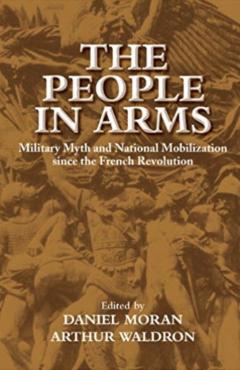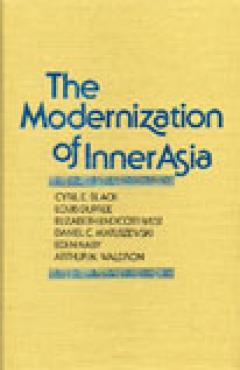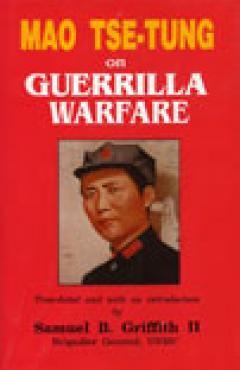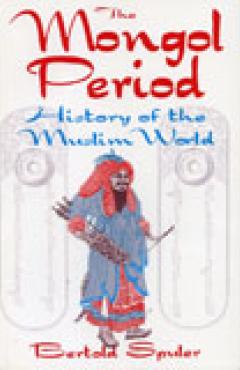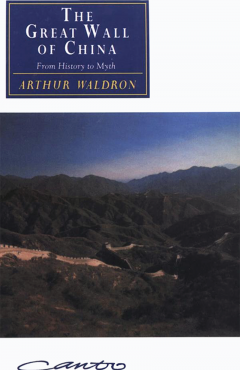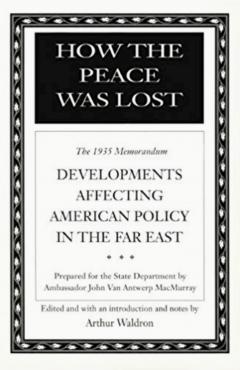Arthur Waldron has been the Lauder Professor of International Relations in the Department of History at the University of Pennsylvania since 1997. He works mostly on the history of Asia, China in particular; the problem of nationalism, and the study of war and violence in history. Educated at Harvard (A.B. ’71 summa cum laude Valedictorian, Ph.D. ’81) and in Asia, where he lived for four years before returning to Harvard. He previously taught at Princeton University, the U.S. Naval War College (Newport, RI), and Brown University. His publications include The Great Wall of China: From History to Myth (1989), also in Chinese and Italian; The Modernization of Inner Asia (1991); How the Peace Was Lost: The 1935 Memorandum "Developments Affecting American Policy in the Far East" Prepared for the State Department by John Van Antwerp MacMurray (1992), also in Japanese; From War to Nationalism: China’s Turning Point, 1924–1925 (1995), also in Chinese; and (with Daniel Moran) The People in Arms: Military Myth and National Mobilization since the French Revolution (2003). In addition, he has fourteen articles in peer reviewed journals, ten chapters in books, and two edited volumes in Chinese, as well numerous scholarly and popular reviews and journalistic essays. In government, he served as one of twelve members of the highly-classified Tilelli Commission (2000–2001), which evaluated the China operations of the Central Intelligence Agency. He was also an original member of the Congressionally-mandated U.S-China Economic and Security Review Commission (2001–2003). He is a member of the Council on Foreign Relations and former Director of Asian Studies at the American Enterprise Institute. A regular traveler, he has visited some fifty countries, in Asia and beyond. He has lectured all over the world, including Europe, Russia (in Russian), Japan, and Australia.
Note: Prof. Waldron is no longer accepting new Ph.D. advisees.
Personal Statement
Two early experiences set my scholarly trajectory. The first came when I was eleven years old. I wandered by chance into an exhibit that was visiting the Boston Museum of Fine Arts, of the sixty greatest masterpieces of Chinese painting, from the National Palace Museum in Taipei. I was overwhelmed by the new civilization this work revealed, and resolved some day to learn more about it. I kept that promise by learning Chinese after college graduation, living in Asia, and finally receiving a Ph.D in History from Harvard in 1981.
The second experience came a few years later, when I was an exchange student at an English boarding school. By chance I joined a group of school children on a super budget tour (second class rail, all the way from London) that took me to Central Europe, Poland, Russia, Armenia, Georgia, and Azerbaijan. In the following years I traveled with the same group twice more, once across Siberia by rail for a tour of Japan. This made me aware of how big the world was outside of the Europe and United States, whose past so regularly defines academic "history."
Today my first loyalty is to the study of Chinese history, particularly the crucial period from the late Qing to the early Communist period. From myself and from my student colleagues I expect willingness to work hard on language, to dig around creatively in libraries and archives, both here and abroad, and to think in an empirical and creative way about what is found. Much treasure for this period has barely been looked at—and it is very relevant to the present. Students of mine have written dissertations on charitable institutions in that period, on debates over the sort of constitutional structures China required, the degree to which concepts of legality were actually assimilated in pre-1949 China, and on US policy toward China in the late 1940s.
But I also embrace wholeheartedly Penn's wonderful (and unusual) commitment to the study of world history. The age of purely national histories, often didactic, is past, and for China as much as for France or the United States. Penn has already revised its European history curriculum to reflect this fact, and Asian history is moving the same way. I am developing a brand new introductory course: the sequence of History 003 "Asia in a Wider World" and History 004 "Asia in a Modern World." This looks at Asia from Turkey to Japan, and from Russia and Mongolia to India and Indonesia. The challenge, of course, is to combine thorough grounding in the facts and names and geography—often baffling to freshmen unless well taught—with some sense of the fascinating issues that weave all of these states together: trade, intellectual exchange, migration, the spread of disease, and, not least, war.
Which brings me to a specialty of mine. Diplomatic history is a well-established field or research in which Penn has great strength. I have published on Asian diplomacy, and supervised graduate students, one of whom (from China) is now a full professor at his home university there. I welcome students interested in Asian diplomatic history.
But I have long been convinced that while historians do a lot of looking at the origins and the consequences of wars, they tend, for understandable reasons, to avert their eyes from the wars themselves, with their almost incomprehensible violence, cruelty, and suffering. Yet this violence is often determinative; it is not a clearing mechanism for "larger factors" and it deserves study in its own right. Understanding war, however, is not easy: "strategic analysis" is a specialty that one has to learn, as one does demography or economics. I had the good fortune of learning it in seven years as Professor of Strategy and Policy at the Naval War College (a military graduate school for mid career officers and civilians from the State Department, Intelligence agencies, and more than forty foreign countries). Today I teach an undergraduate course reflecting the expertise I acquired there: we look at wars beginning with Athens versus Sparta in the Peloponnesian conflict, and then drawn from all over the world (and not just Europe and the United States) while reading and analyzing such strategic thinkers as Sun Tzu, Kautilya, Clausewitz, Mahan, Corbett, and others. This has proved a popular and exciting course. I have also worked on more fundamental studies of aggression and conflict with the Harry Frank Guggenheim Foundation, and the Solomon Asch Center for the Study of Ethnic Conflict at Penn, and worked closely with such authorities as Sir Michael Howard, Peter Paret, Geoffrey Parker, Immanuel Sivan, Lai Xinxia, Guo Jianlin, Chang Jui-te, Diana Lary, and others.
Although I pay a lot of attention to how wars are fought, I am particularly interested in how war affects participants and society, transforming institutions, social relations, even culture and the arts. For Europe, "memory" of war has grown into almost an industry, started by the works of Halbwachs, Mosse, and others. For Asia and the rest of the world, however, their questions are barely being asked, let alone answered. How do the Vietnamese make historical sense of their civil war? How to the Chinese memorialize their war dead? These are topics of passionate interest to me, and they lead to broader questions of national definition and cultural values, ethnicity, family and community life, the arts and symbolism, etc.
For further information, the best source is Wikipedia. Please note that the Wiki editors put this entry in to start with, not Professor Waldron, though I am greatly indebted to Patrick Liao '15, a Penn undergraduate and Wiki editor, for improving the page in ways that would have been impossible for a pre-digital baby.
- HIST 003 Asia in a Wider World
- HIST 004 Asia in a Modern World
- HIST 159 Technology, Policy and War
- HIST 160 Strategy, Policy and War
- HIST 412 Topics in Asian History
- HIST 412 Aspects of Violence
- HIST 630 How Should Historians Read the Chinese Classics?

